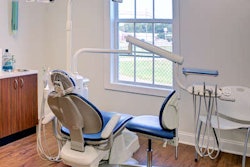
Older adults were more likely to delay dental care than any other type of healthcare during the COVID-19 pandemic, according to an analysis published in March by the CareQuest Institute for Oral Health.
The CareQuest Institute is a nonprofit focused on creating a more accessible oral health system. The institute looked at three surveys of Medicare beneficiaries to analyze healthcare delays during the pandemic. Almost 6 million Medicare beneficiaries put off dental care during the pandemic -- more than those who delayed medical care, surgery, vision, or hearing services.
"Delays in dental care have serious ramifications," according to the report. "Among Americans aged 65 or older, one in five have untreated tooth decay, and two-thirds have periodontal disease. Postponing care means these infections are likely to become more severe, making them more difficult and costly to treat."
Delays in dental care during the pandemic echo what public health researchers have known for years: Adults are more likely to forgo dental care than other types of care. For older adults, the barrier to dental care is compounded by the lack of dental coverage in traditional Medicare, according to the report's authors.
To better understand the impact of the COVID-19 pandemic on the dental care of older adults, the CareQuest Institute analyzed data from the Medicare Current Beneficiary Survey, an in-person survey of Medicare beneficiaries. A supplement consisting of rapid-response surveys was conducted to better understand how things changed with the COVID-19 pandemic.
The surveys were done in the summer of 2020, fall 2020, and winter 2021. More than 80% of study participants were 65 years of age or older.
In summer 2020, 1 in 5 Medicare beneficiaries delayed at least one type of healthcare due to the COVID-19 pandemic. Dental care was the most common service to be postponed, with nearly 44% of delayers (5.7 million people) delaying dental care that summer.
In 3 out of 4 instances where dental care was delayed, providers decided to delay care, often by closing offices. In 18% of cases, the beneficiaries chose to delay care, and 8% of delays were a mutual decision between providers and patients.
In the fall of 2020, the percentage of beneficiaries who delayed care dropped to 8%. People who delayed care at this time were about as likely to delay medical treatment (33%) as dental care (32%).
In winter 2021, 7% of beneficiaries delayed healthcare, but the trends appeared to shift from earlier surveys. For the first time, Medicare beneficiaries were more likely to delay their own care than providers. Further, 15% of beneficiaries cited transportation issues as a cause of delaying dental care, up from 6% in the summer of 2020 and 9% in fall 2021.
The delays in oral healthcare care during the pandemic concern authors about the consequences for older adults' overall health. The poll's authors cited an increased risk of heart attack and stroke for people with periodontal disease, as well as the link between gum health and diabetes outcomes.
"Poor oral health has consequences for overall health," wrote the report's authors.
While at least some of the delay in dental care can be attributed to practice closures, the CareQuest Institute also used the findings to argue for strengthening Medicare to include dental coverage.
"We continue to advocate that dental care be covered by Medicare because it's a commonsense solution to the many barriers that millions of people, including older adults, face when accessing healthcare," Dr. Michael Monopoli, MPH, vice president of grant strategy at CareQuest Institute, said in a statement. "It's also a way for us to address some of the many adverse effects of the COVID-19 pandemic, including a likely increase in oral disease because of delayed care."



















